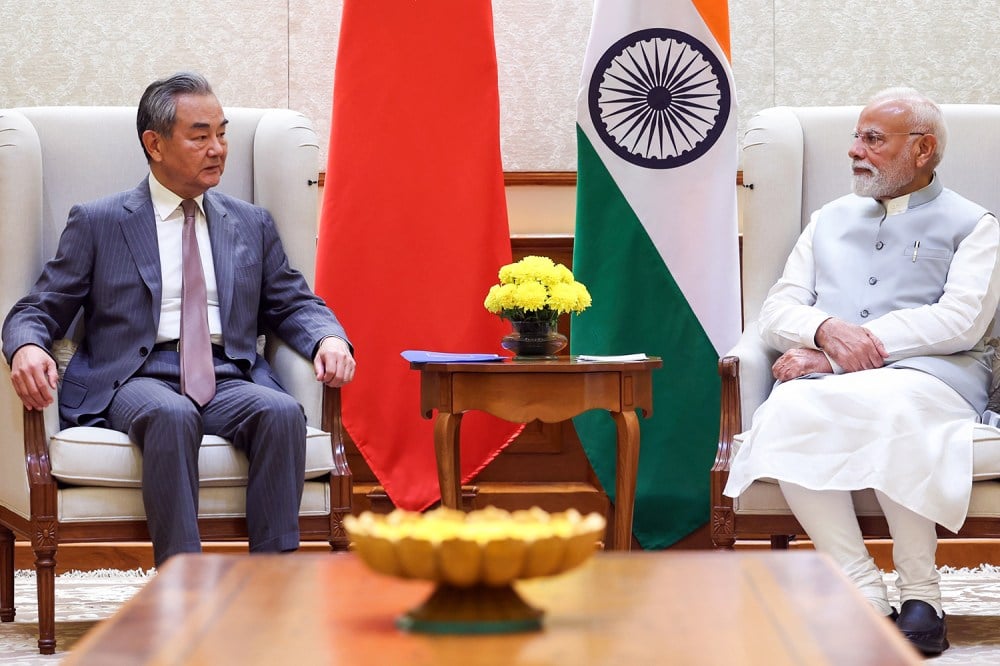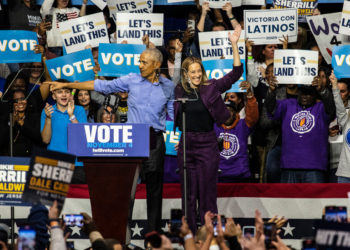Chinese Foreign Minister Wang Yi traveled to New Delhi this week, marking the first visit of a high-level Chinese official to the Indian capital since the two countries agreed to disengage along their Himalayan border last October. Deadly border clashes in the Galwan Valley in 2020 had previously sent bilateral relations into a deep freeze.
Wang met with at least three key Indian officials: Prime Minister Narendra Modi, External Affairs Minister S. Jaishankar, and National Security Advisor Ajit Doval. After Modi’s meeting with Wang, the Indian leader highlighted the “steady progress” made since the 2020 military standoff. Wang reiterated a familiar platitude about the need for India and China not to be “adversaries” but “partners” and that the two sides should “trust and support” each other.
Furthermore, Modi formally accepted Chinese President Xi Jinping’s invitation to meet him on the sidelines of the Shanghai Cooperation Organisation (SCO) summit in China, to be held on Aug. 31 and Sept. 1. It is impossible to predict what substantive outcomes are likely to emerge from the meeting. More than likely, the two leaders will again express their interest in bolstering ties and in opposing U.S. President Donald Trump’s tariff wars.
But what prompted India to invite Wang to New Delhi now, given that the relationship with Beijing has remained mostly frosty? No one in the Indian foreign-policy establishment made any public statement explaining why India chose this moment to host the Chinese foreign minister. Indeed, it seems that India decided to try to improve relations with China for one compelling reason: the drastic deterioration in its ties with the United States, which until recently were mostly on an even keel following years of bilateral engagement.
The sharp decline in U.S.-India relations stems largely from Trump’s words and actions on both strategic and economic fronts. On the security dimension, after India and Pakistan reached a cease-fire in their May conflict, Trump hosted Pakistan Army chief Asim Munir at the White House. The June meeting came shortly after Pakistan proposed that Trump receive the Nobel Peace Prize for facilitating the cease-fire. In New Delhi, the scene revived dormant memories about past U.S. dalliances with Pakistan’s military establishment.
The economic factor is no less important. On July 31, Trump announced a 25 percent base tariff on India; then, on Aug. 6, he signed an executive order imposing a second levy of 25 percent by Aug. 27 unless New Delhi stops purchasing oil from Moscow. To compound matters, this week White House trade advisor Peter Navarro wrote a column in the Financial Times condemning India for its purchase, refining, and reselling of Russian oil amid Russia’s war in Ukraine. On Tuesday, U.S. Treasury Secretary Scott Bessent also excoriated India for “profiteering” from Russian oil.
Based on their experience during Trump’s first term, Indian officials seemed to think that they could maintain good relations with the second Trump administration. Trump’s about-face has left India astonished. To assuage the administration’s stated misgivings, India has offered to make some concessions on trade but has adopted an unyielding stance on others. Most importantly, it has steadfastly refused to stop purchasing and refining Russian oil, of which it is the second-largest buyer (after China).
Is India supposed to accept the ostensible rationale for these punitive tariffs uncritically? The price of India’s purchases of Russian oil and subsequent sales on the global market remains capped at a level agreed to previously by both Washington and New Delhi. As a result, India deems—even if it has not stated as much—the U.S. threat of additional tariffs as hypocritical.
Among analysts of U.S.-India relations, it is widely believed that two factors have led Trump to resort to economic coercion with India. First, they argue that Trump was personally offended by New Delhi’s repeated public statements that he played no role in defusing the India-Pakistan crisis in May. Second, they contend that some of Trump’s trade negotiators remain fixated on prying open the Indian agricultural market, which remains almost entirely closed to foreign competition.
Even as the exact motivations of the United States remain unclear, it is evident that India is looking elsewhere for working partners to balance U.S. power. This largely explains its decision to try to reduce tensions with China, its behemoth northern neighbor and enduring rival. But there is the rub: China is keen on weaning India away from the United States. When New Delhi reached out to Beijing and extended an invite to Wang, it decided to seize the moment.
Unfortunately, India is making a bad bet on China, and it will not end well. New Delhi is locked into an intractable rivalry with Beijing: The two states have differing visions of political order in Asia and beyond, they have a border dispute on which they have made glacial progress, and the asymmetries in their economic and military capabilities are glaring and getting worse. Under these circumstances, India would be foolish to assume that Wang’s visit can lead to genuine rapprochement with China.
If India had any doubts on this score, it should have become more than evident as the visit concluded: From the Indian capital, Wang flew to Kabul and then to Islamabad, where he reached an agreement with the Pakistani government to expand the China-Pakistan Economic Corridor, a main part of Beijing’s Belt and Road Initiative. Wang’s decision to visit Islamabad underscored the enduring partnership between China and Pakistan.
It is difficult to claim that the Chinese delegation made any concessions to their Indian counterparts during Wang’s visit. Worse still, a Chinese foreign ministry readout asserted that Jaishankar had affirmed Taiwan as part of China; in the wake of the Chinese statement, the Indian foreign ministry rushed to clarify that India’s position on Taiwan remained unchanged.
Despite 24 rounds of bilateral talks, India and China are no closer to settling their border dispute in the Himalayas. India has grave misgivings about Beijing’s strategic ties with Pakistan from a national security perspective; during the conflict in May, Pakistan used Chinese-made weapons—including fighter aircraft—against India. Even as Modi and Xi are likely to exchange pleasantries in public, the underlying differences in the relationship will remain unaddressed.
New Delhi’s frustration with Washington is understandable. The Trump administration’s choices could undermine decades of bipartisan efforts to improve and shore up U.S.-India ties. However, India’s effort to court China as a possible counterweight to the United States may turn out to be an infelicitous choice. There is no sound basis for New Delhi making common cause with Beijing, and this seeming convergence of interests is bound to be fleeting.
The post This Isn’t India-China Rapprochement appeared first on Foreign Policy.




